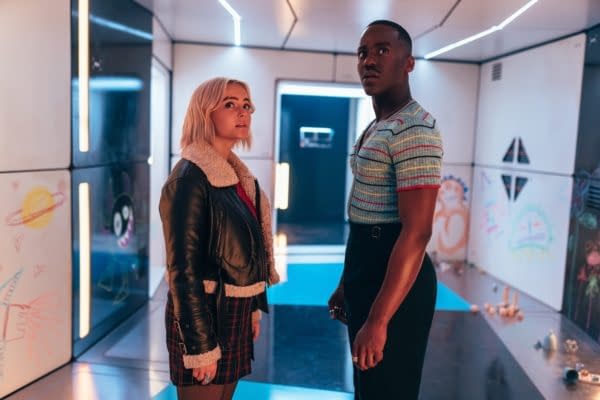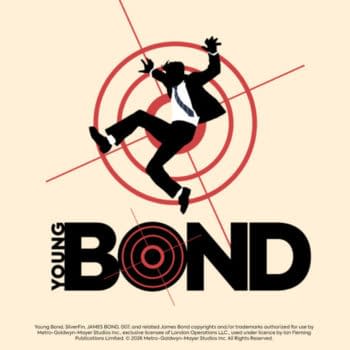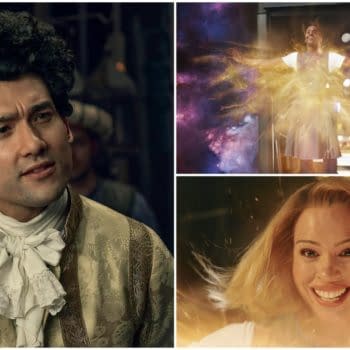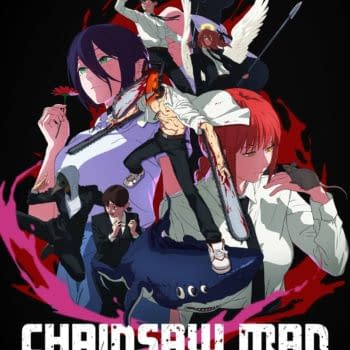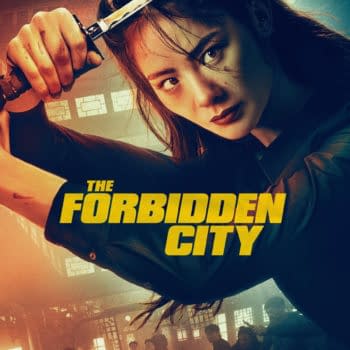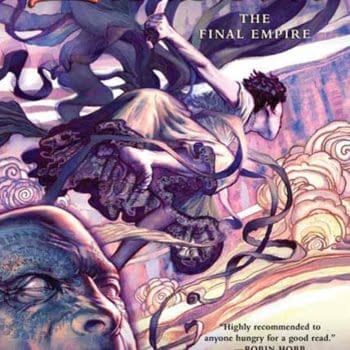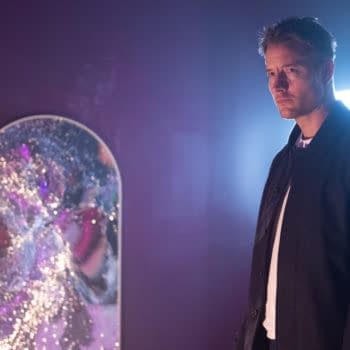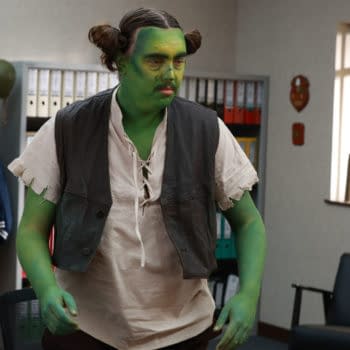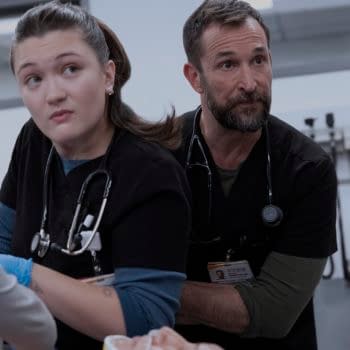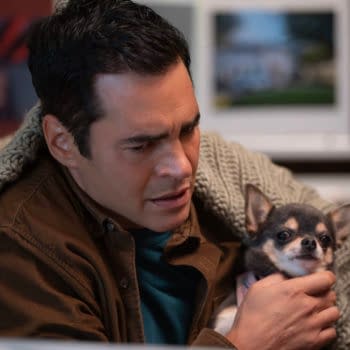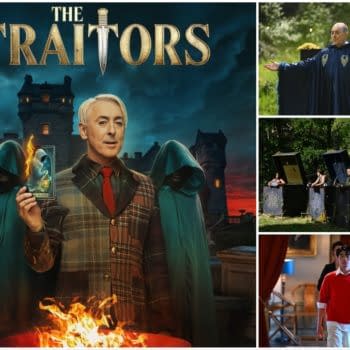Posted in: BBC, Doctor Who, Review, TV | Tagged: bbc, disney, doctor who, Millie Gibson, Ncuti Gatwa, russell t davies, Space Babies
Doctor Who: Defiantly Joyful "Space Babies" Ushers In New Era: Review
Beneath the gleeful silliness & utter madness, Doctor Who season premiere "Space Babies" contains multiple layers of much deeper meaning.
By now, you will have watched the premiere of the new Doctor Who and "Space Babies." I've already said it might be the most insane story Russell T. Davies has ever written, a deceptively light and wacky kick-off to the new season and a new era on Disney+. It is gleefully wacky, shamelessly manipulative, and defiantly joyful. At this point, consider the "MAJOR SPOILERS AHEAD!" sign officially on moving forward – you've been warned!
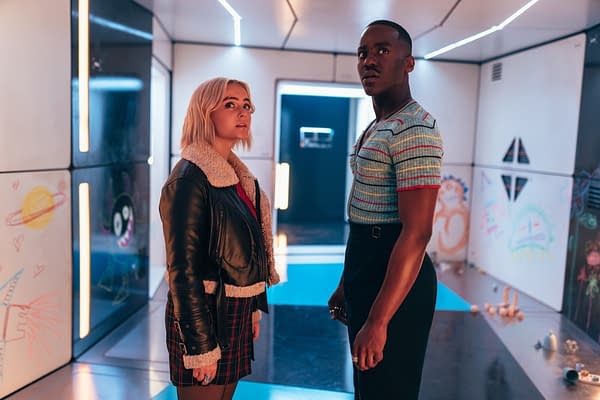
The "Doctor Who" Era Begins – Again
Every new Doctor practically makes Doctor Who a new show all over again. It's a way to bring in new viewers who don't need to trudge through sixty years of continuity and lore. Granted, The Fifteenth Doctor and Ruby Sunday were first introduced in the 2023 Christmas Special "The Church on Ruby Road," but that was just a prelude to their dynamic as a duo that anchors the show. The first five minutes of "Space Babies" take its cue from how many American series are written in how characters introduce and explain themselves for the first time to an audience but are cranked up with wit. Instead of dull exposition, The Doctor's explanation of who he is comes with a lot of his personal commentary about Gallifrey and how Timelords are named with honourifics because "They're a bit posh." It establishes Ncuti Gatwa and Millie Gibson's knack for comedy banter and chemistry that's going to drive the series. No longer is it a relationship between an older man and a young girl, but equals: they're both young adults and best friends who get into trouble together. The gag about changing history with just the slightest accident might be a whole plot in the old show or another SciFi series, but it's taken care of within a minute before it moves onto the real plot of the premiere.
Yes, we've been here before, and it has to feel new. There's the scene of The Doctor bringing a companion on her first spaceship in the future. Davies finds new things to say, investing the moment with the character's emotions. Standing on a spaceship in the future means freedom for the Doctor. It's showing the companion the universe. There's even a harmless joke about Cantonese being the universal human language of the future, not Mandarin Chinese, and the written Chinese on the screen is even accurate – it's in Classical Chinese, which is how Cantonese is written.
Easter Eggs and Deeper Meanings
Hardcore fans of the original show get to hear The Doctor bring up The Valeyard and The Rani, two villains they keep hoping the series will bring back even though they're very weak villains that were already done better in the different versions of The Master over the decades. When The Doctor tells Ruby the Timelords were wiped out in a genocide, it carries extra meaning in Ncuti Gatwa's real-life story as a refugee whose family fled a real genocide in Rwanda when he was a small child and found a thriving life and career as a Scotsman in the UK. It's particularly ironic and monstrous that the current UK Tory government is determined to ship refugees to Rwanda, a country that has declared it will execute LGBTQ people. That subtext was not an accident in the script. Davies knows what he's doing. And, of course, we get the first proper close-up of the new sonic screwdriver, which will be out in toy stores before long.
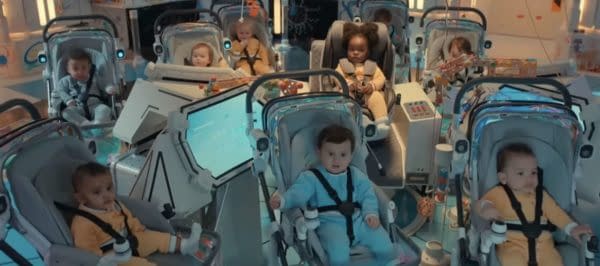
"Space Babies": A Take on Ridley Scott's "Alien"
The plot of this premiere is a wacky comedy version of Alien. The Doctor and Ruby arrive on a ghost ship with a living crew and a scary monster with big teeth lurking in its bowels. Except it's funny, wacky, and it's a rebuke. Where Alien is set in a hostile universe of predators and prey, Doctor Who opts to take the pacifist route. The monster is part of a scenario created by a literal-minded ship AI that's programmed to help. As the Fourth Doctor (Tom Baker) once said, "Computers are very sophisticated idiots." The Boogeyman looks scary, but the computer is generating an ultrasonic frequency that induces fear and panic in mammals. Jocelyn acts out of fear and tries to kill it by sending it out the airlock like Ripley (Sigourney Weaver) did in Alien. The funniest joke in the story is the language filter that keeps carer Jocelyn's curse words from being heard by the babies. The space babies themselves are hilariously surreal, absurd, and poignant and a shamelessly cute device to tug at our hearts. Davies doesn't write them as adults in babies' bodies but as babies who can articulate their feelings. The whole episode is practically a spoof of the "Save the Cat" demand in Hollywood screenwriters that dictates that the heroes should always be shown being heroic in saving innocents, and what's more "Save the Cat" than a space station full of adorable babies? The sheer audacity is hilarious!
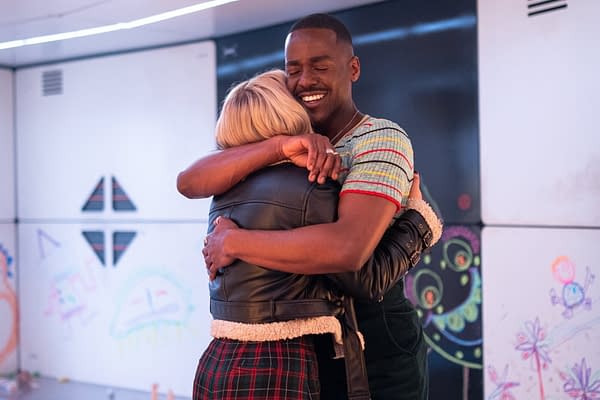
Every Life Matters or Nobody Matters
Yes, that's a quote from bestselling author Michael Connelly's Bosch, but The Doctor believes in it too. The monster was created from all the space babies' snot, making it the grossest monster in the history of Doctor Who and one of the funniest. And what happens to Ruby might be the grossest thing to happen to a companion in the show's entire history. But the "Boogeyman" is another space baby! It's just got big vagina dentata teeth in an overt nod to H.R. Giger's xenomorph. It turns out the Boogeyman is really kind of like a puppy… with big teeth.
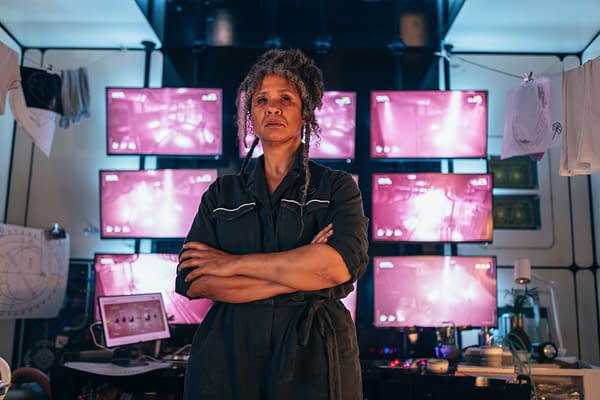
A Tale of Foundlings and Motherless Children
"Space Babies" is a direct follow-up to "The Church on Ruby Road", which began the theme of foundlings and adopted children. The Doctor is struck by the coincidence of meeting a fellow foundling in Ruby. They're kindred spirits, curious about each other and the universe while both nursing the same wound. All adopted children are haunted by abandonment. You could say the biggest theme of Doctor Who had been hiding for over sixty years: The Doctor is a wandering orphan forever seeking fellow orphans and found family.
The babies on the station are all vat-grown and parentless, all foundlings, all abandoned by the staff of the station whose indifference reflects many governments. That the government in charge of the station ordered the staff to abandon it due to budget cutbacks but still allowed the babies to be born could be said to reflect anti-abortionists who demand all babies are born but will do nothing for their welfare after that. It takes one woman, an accountant, who stays behind to care for them because of her compassion. She's a direct reflection of Ruby's adopted mother, and it's not a coincidence that Golda Rosheuvel's Jocelyn was made up to look like Michelle Greenidge, who plays Carla, Ruby's mum. Carla and Jocelyn are both women who volunteered to look after over a dozen abandoned children.
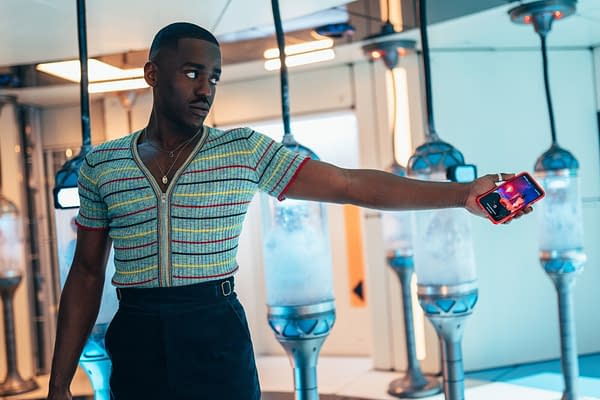
Doctor Who: Showing Off Loudly to Get Maximum Eyeballs
In this post-Buffy era of streaming, where Science Fiction and Fantasy series are all over the streaming services with increasingly familiar and clichéd tropes making them increasingly generic and predictable, Davies has written Doctor Who as a hyper-manic and gleefully nutty show that takes those familiar tropes and inflates them to the point of looking new, shiny and utterly mad. That's a way to make everyone sit up and pay attention rather than get bored into indifference. There's a lot riding on the new Doctor Who, and "Space Babies" is here to grab your attention and make you glad for it.
Doctor Who is now streaming on Disney+.
